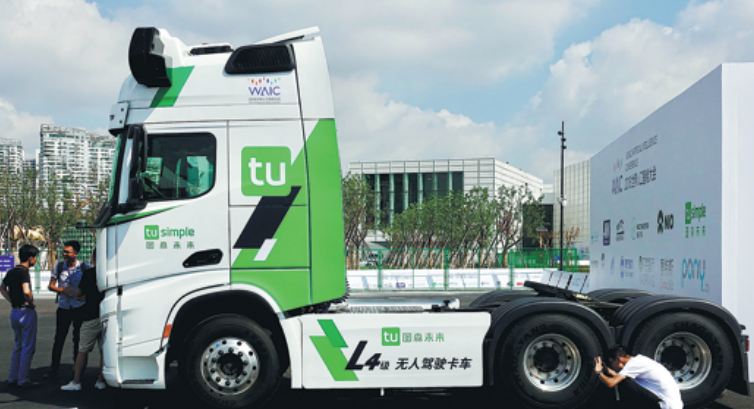Shanghai issues first test plates for self-driving trucks
By Cao Chen in Shanghai | China Daily | Updated: 2018-10-25 10:19

TuSimple, a self-driving truck solutions company, was one of the two companies granted China's first road test plate for autonomous driving trucks in Shanghai on Oct 16.
Founded in 2015, TuSimple focuses on the research and development of large-scale freight truck self-driving systems, with R&D centers in Beijing, Shanghai and Hebei province, as well as in California and Arizona.
Its self-driving vehicles use a camera-centric system and sensor fusion technology to achieve a pixel-level vision range of 1 kilometer. The technology enables the vehicles to operate safely in multiple driving scenarios.
TuSimple has conducted automated driving tests and trial operations in China and the United States. In 2017, it was granted a license for automatic driving road testing in the US by the California Department of Motor Vehicles.
The company started commercial test operations on US highways in August, and it has so far completed more than 13,000 hours of real and simulated road tests.
Momenta, a self-driving technology company and the other plate winner, focuses on core algorithms for autonomous driving. Its products, from Level 0 to Level 4, provide various self-driving planning and big data-related services. Vehicles at L4 can complete all driving operations independently.
As an important application of artificial intelligence, connected vehicles have access to the internet, other vehicles, traffic and the environment, which will make their journeys safer, easier, more comfortable and efficient.
A goal set by the Ministry of Industry and Information Technology is that by 2020, half of China's new cars and vehicles will become intelligent. Wireless networks will cover 90 percent of cars in major Chinese cities.
For driverless trucks, the innovation will improve the efficiency of logistics and transportation, and reduce costs.
More capital has flooded into the autonomous trucks sector this year. For example, G7, a leading internet of things technology company in China, GLP, a global provider of logistics facilities and technology-led solutions, and NIO Capital announced a joint venture in April to develop industry-leading, autonomous driven electric heavy-duty trucks.
China's e-commerce giants, such as Alibaba, JD and Suning, have been developing their own autonomous truck technology.
In Shanghai, road tests for intelligent network vehicles exceeded 15,000 km by the end of September, according to data from the Shanghai Economic and Information Commission. No traffic accidents or interference with road transportation occurred during the tests, the commission said.
With Shanghai's implementation of the national automobile industry policy, the city has expanded cooperation with international enterprises, and optimized its business environment to promote the development of the intelligent connected automobile industry.
In March, Shanghai took the lead in formulating management measures for intelligent connected vehicle road testing, with 5.6 km of roads designated for the tests.
























